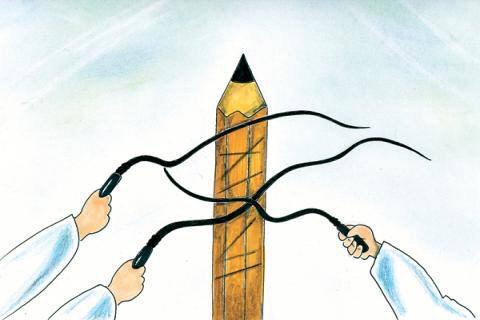Saudi Flogging Blogging

Here's a great cartoon from an Arabic speaking newspaper which lampoons Saudi Arabia and its inhumane flogging of fellow citizens who have taken to the internet to criticise or challenge aspects of the way their country is currently governed.
Flogging bloggers might achieve its aim of scaring people into silence in the short-run, but in the past 100 years more and more countries of the world have become relatively tolerant, secular, live-and-let-live democracies.
No one seems to be queuing up to follow Saudi Arabia's example where an absolute monarchy rules, propped up by a religious theocracy which bans women from driving while saying it's OK for them to use vacuum cleaners and washing machines.
'Justice' - Saudi Style (13 October 2013)
More dispiriting news out of Saudi Arabia - the price of a young life (a girl's life) is only 8 years in prison and 600 lashes which sounds painful, but is as nothing compared to what this maniacal bully did to little 5-year-old Lama al-Ghandi.
I suppose it's much better than walking away Scot-free which is what was originally going to happen to Fayhan al-Ghamdi - until a Saudi Twitter campaign intervened to demand proper sanctions for violent crimes against women and children.
What kind of paranoid religious view suspects a a 5-year-old child of losing her virginity - and then punishes that child by literally beating her to death?
I take my hat off to the Saudi women who campaigned for a life sentence for this thug, but I was struck by the notion of Fayhan al-Ghamdi receiving a lighter sentence because he paid 'blood money' to Lama's mother - which just goes to show that men in fundamentalist Islamic countries not only control all the financial assets in a relationship - they also make up and interpret all the laws.
Saudi preacher jailed over daughter's death
A Saudi preacher accused of torturing his five-year-old daughter and beating her to death has been sentenced to eight years in prison and 600 lashes.
The case of Fayhan al-Ghamdi made headlines around the world earlier this year when it was suggested that a Saudi court might let him walk free.
Activists began a campaign named after his daughter, "I am Lama", to press the authorities to prevent that happening.
Al-Ghamdi is not recognised as a cleric by the Saudi religious establishment.
The horrific details of the abuse that Lama al-Ghamdi suffered were revealed in medical records from the hospital where she was treated for 10 months before she died.
Her ribs were broken, a fingernail was torn off and her skull crushed. She had been beaten with a cane and electric cables. She had also suffered burns.
The abuse had happened while she was with her father, who was separated from her mother.
I suppose it's much better than walking away Scot-free which is what was originally going to happen to Fayhan al-Ghamdi - until a Saudi Twitter campaign intervened to demand proper sanctions for violent crimes against women and children.
What kind of paranoid religious view suspects a a 5-year-old child of losing her virginity - and then punishes that child by literally beating her to death?
I take my hat off to the Saudi women who campaigned for a life sentence for this thug, but I was struck by the notion of Fayhan al-Ghamdi receiving a lighter sentence because he paid 'blood money' to Lama's mother - which just goes to show that men in fundamentalist Islamic countries not only control all the financial assets in a relationship - they also make up and interpret all the laws.
Saudi preacher jailed over daughter's death
By Sebastian Usher
BBC News

Fayhan al-Ghamdi appeared on religious satellite TV channels as a preacher
A Saudi preacher accused of torturing his five-year-old daughter and beating her to death has been sentenced to eight years in prison and 600 lashes.
The case of Fayhan al-Ghamdi made headlines around the world earlier this year when it was suggested that a Saudi court might let him walk free.
Activists began a campaign named after his daughter, "I am Lama", to press the authorities to prevent that happening.
Al-Ghamdi is not recognised as a cleric by the Saudi religious establishment.
The horrific details of the abuse that Lama al-Ghamdi suffered were revealed in medical records from the hospital where she was treated for 10 months before she died.
Her ribs were broken, a fingernail was torn off and her skull crushed. She had been beaten with a cane and electric cables. She had also suffered burns.
The abuse had happened while she was with her father, who was separated from her mother.
Lama's death triggered a Saudi Twitter campaign to criminalise violence against women and children
It was reported that al-Ghamdi had suspected his daughter of losing her virginity and had beaten her and molested her in response.
It was even suggested that he had raped her himself, although this was denied by Lama's mother.
The outrage over the case intensified earlier this year when activists suggested that he might walk free, despite having confessed to having beaten Lama.
The judge in the case suggested that one reading of Islamic law meant a father could not be held fully accountable for the death of his children.
Activists warned that it looked like he might be released if the mother accepted blood money.
The story grabbed headlines across the world.
It shone a light on child abuse in Saudi Arabia where rights activists say strict codes of family privacy and a patriarchal tradition make it a serious problem.
The Saudi authorities set up a child abuse helpline in response.
Now, a verdict has been reached in the same court and with the same judge.
One of the activists involved in the campaign, Aziz al-Yousef, told the BBC that she was disappointed that Fayhan al-Ghamdi did not receive a life sentence.
But Lama's mother had in the end accepted the offer of blood money, despite having once said she would never take it.
She said she needed it to help support her surviving children. That ruled out a life sentence.
Another campaigner who fought for a longer sentence, Manal al-Sharif, told the BBC that she did not believe the penalty was enough.
But she does feel that the I am Lama campaign - with the international pressure it brought to bear on the authorities - was instrumental in leading to the recent introduction of an unprecedented new Saudi law against domestic violence.
However, she added that she still has deep reservations over how effectively this will be enforced in practice.
It was reported that al-Ghamdi had suspected his daughter of losing her virginity and had beaten her and molested her in response.
It was even suggested that he had raped her himself, although this was denied by Lama's mother.
The outrage over the case intensified earlier this year when activists suggested that he might walk free, despite having confessed to having beaten Lama.
The judge in the case suggested that one reading of Islamic law meant a father could not be held fully accountable for the death of his children.
Activists warned that it looked like he might be released if the mother accepted blood money.
The story grabbed headlines across the world.
It shone a light on child abuse in Saudi Arabia where rights activists say strict codes of family privacy and a patriarchal tradition make it a serious problem.
The Saudi authorities set up a child abuse helpline in response.
Now, a verdict has been reached in the same court and with the same judge.
One of the activists involved in the campaign, Aziz al-Yousef, told the BBC that she was disappointed that Fayhan al-Ghamdi did not receive a life sentence.
But Lama's mother had in the end accepted the offer of blood money, despite having once said she would never take it.
She said she needed it to help support her surviving children. That ruled out a life sentence.
Another campaigner who fought for a longer sentence, Manal al-Sharif, told the BBC that she did not believe the penalty was enough.
But she does feel that the I am Lama campaign - with the international pressure it brought to bear on the authorities - was instrumental in leading to the recent introduction of an unprecedented new Saudi law against domestic violence.
However, she added that she still has deep reservations over how effectively this will be enforced in practice.
Women Drivers (18 September 2014)
Saudi Arabia continues to make a fool of itself over its ban on women driving which is unique throughout the world as far as I know.
I often wonder why stories like this one don't appear on the TV news because who in their right mind would defend the arrest of a woman, Al Farid, for driving herself to hospital.
I presume the religious rulers of Saudi Arabia would be forced to explain this bizarre practice if it began to receive worldwide publicity, so why not run a campaign which challenges the logic behind women being banned from driving cars while allowing the use of other modern inventions such as washing machines, air conditioning and fridges?
Saudi businesswoman and member of a human rights group fined for driving herself to hospital
In Saudi Arabia, it is not illegal for women to drive but, rather illegal for them to be granted a driver’s license
By KASHMIRA GANDER - The Independent
A female member of a Saudi human rights organisation was reportedly fined by police after she drove herself to hospital.
Aliyah Al Farid, a businesswoman and member of the National Society for Human Rights (NSHR), suffers from a chronic condition which means she is occasionally forced to visit hospital.
In Saudi Arabia, it is not illegal for women to drive on the road, but it is illegal for them to be granted a driver’s license – effectively making the former law meaningless.
Worried by her condition and unable to find a chaperon, Al Farid, who has reportedly been caught driving twice before, set off in her husband’s car, but was caught by police during her journey, Al-Hayat daily reported, according to the Saudi Gazette.
When Al Farid explained to police that she was very ill and did not have anyone to help her, officers agreed that she could drive to hospital on the condition that they would wait for her outside.
Leaving the facility in an undisclosed location, she found four traffic police vehicles and she was taken to the local Traffic Department.
Al-Farid told reporters: "I told the traffic officers that I had to drive because it was an emergency case.
"I didn’t do it on purpose and I’m not after fame or media hype. I was very sick and that was it."
Al-Farid, who learned how to drive in Bahrain does not have a Saudi driver’s license.
"There are no laws here that ban women from driving cars on the road," she said, adding she had refused to agree to a police request to never drive again.
Al-Farid owns a centre caring for people with special needs and on occasion must rush her patients to hospital.
"We can’t leave an epileptic patient convulsing on the ground while waiting for our male driver to come and transport him to hospital.
"I have to get behind the steering wheel and do it," she told the newspaper.
And as the area where she lives is remote, taxi drivers often refuse to drive her for fear that their cars might get damaged, she added.

